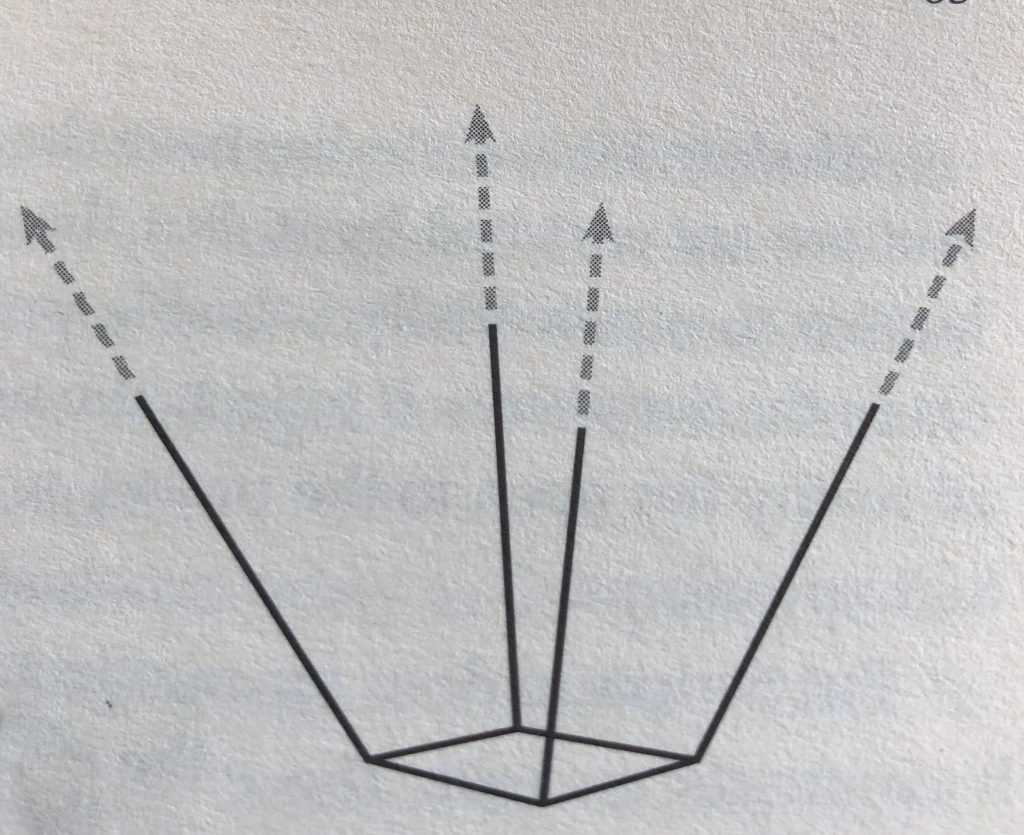The Second Half
In the first half, my faith was misguided. Transition to the second half brought a deeper and more truthful understanding of faith.
A faith centered, not in my ability to effect my salvation through rule keeping, but a faith in a Trinitarian God, through whom all things were created and exist. Faithfulness is no longer measured by rule keeping, Faithfulness is now defined defined by love for God with all my heart, soul, strength and mind. And love for my neighbor as myself.
The following are some scripture passages prominent in my transition:
Isaiah 6:5 NIV
“Woe to me!” I cried. “I am ruined! For I am a man of unclean lips, and I live among a people of unclean lips, and my eyes have seen the King, the Lord Almighty.”
Psalm 73:16-17 NIV
When I tried to understand all this, it troubled me deeply till I entered the sanctuary of God; then I understood their final destiny.
John 6:29 NIV
Jesus answered, “The work of God is this: to believe in the one he has sent.”
Romans 3:20 NIV
Therefore no one will be declared righteous in God’s sight by the works of the law; rather, through the law we become conscious of our sin.
Romans 7:6 NIV
But now, by dying to what once bound us, we have been released from the law so that we serve in the new way of the Spirit, and not in the old way of the written code.
Ephesians 2:8-10,13 NIV
For it is by grace you have been saved, through faith—and this is not from yourselves, it is the gift of God— not by works, so that no one can boast. [For we are God’s handiwork, created in Christ Jesus to do good works, which God prepared in advance for us to do.
But now in Christ Jesus you who once were far away have been brought near by the blood of Christ.
Galatians 5:22-23 NIV
… the fruit of the Spirit is love, joy, peace, forbearance, kindness, goodness, faithfulness, gentleness and self- control. …
2 Corinthians 3:3-6 NIV
You show that you are a letter from Christ, the result of our ministry, written not with ink but with the Spirit of the living God, not on tablets of stone but on tablets of human hearts. Such confidence we have through Christ before God. Not that we are competent in ourselves to claim anything for ourselves, but our competence comes from God. He has made us competent as ministers of a new covenant—not of the letter but of the Spirit; for the letter kills, but the Spirit gives life.
1 Timothy 4:10 NIV
That is why we labor and strive, because we have put our hope in the living God, who is the Savior of all people, and especially of those who believe.
It is important to understand that transition into the second half is not a discrete event, but is a continual process extending to the end of life.Although my faith is distinctly different, I am fully aware that I have only begun to plumb the depth and breath of my relationship with the Infinite.
An understanding essential to faith development is illustrated by the following:

This image reflects my mindset in the first half. The solid lines represent the known. As knowledge increases, the unknown, represented by dotted lines, is reduced permitting greater control over my life. The implications to faith development are profound. Transcendence is squeezed out. (Thanks Leonard Allen)

The second image illustrates my mindset in the second half. Rather than driving out the unknown, it is embraced. The more that is learned the more there is to be learned. Rather than reducing transcendence, it is enlarged. The immensity of that reality is overwhelming. (Thanks Leonard Allen)
The following images depict my relationship to God in the first half and the second half. (Thanks Pastor Paul)


My faith in the first half was misguided, but the faith challenges of the first half are also challenges to my faith in the second half. Sin, myopia and disenchantment, each in their particular fashion, ultimately sabotage our efforts to become the beings we were created to be. Creatures created in the image of their creator.
Hopefully, the preceding has provided a second half framework that provides some insight into the challenges to my faith in the second half.
Faith challenges in the Second Half
People look at you and think you’re saints, but beneath the skin you’re total frauds.”
Matthew 23:28 MSG
The simplest way I can describe the difference between my faith in the first half and my faith in the second half is: The first half was DO, the second half is BE. However, that description is a caricature and fails to embrace the deep paradox of Christian faith, which is BE and DO.
That paradox is apparent in 2 Peter 1:2-9
- Forgetting my sins are forgiven.
His divine power has given us everything we need for a godly life through our knowledge of him who called us by his own glory and goodness. Through these he has given us his very great and precious promises, so that through them you may participate in the divine nature, having escaped the corruption in the world caused by evil desires.
For this very reason, make every effort to add to your faith goodness; and to goodness, knowledge; and to knowledge, self-control; and to self-control, perseverance; and to perseverance, godliness; and to godliness, mutual affection; and to mutual affection, love. For if you possess these qualities in increasing measure, they will keep you from being ineffective and unproductive in your knowledge of our Lord Jesus Christ. But whoever does not have them is nearsighted and blind, forgetting that they have been cleansed from their past sins. 2Peter 1:2-9
Peter asserts , if the qualities that keep us from being ineffective and unproductive are missing, we are near-sighted and blind and have forgotten our sins are forgiven.
Forgetfulness is an affliction of our humanity. More obvious in my later years, memory has been a challenge throughout my life. Reasons for that are in dispute, but the problem is real. It seems to me that scripture is in some way God’s acknowledgement of humanity’s propensity to forget. Scripture tells stories of forgetting and continually admonishes readers to remember. Though it may seem a remote possibility that we could forget what God has done for us through the sacrifice of Jesus for our sins, evidence to the contrary abounds, both in scripture and in our lives. A source of forgetfulness is distraction. Opportunities for distraction are endless in the modern age.
- Failing to trust God/ Self-sufficiency
A struggle that was waged and lost in the Garden of Eden is still relevant for me in the latter years of my faith journey.
The following quotes captures the essence of this challenge.
I fear, that more often than not, we yield to easily to what is doable and practical and popular. In that process we sacrifice the pursuit of our heart’s desire to seek and know God. We find ourselves giving in to our doubts, settling for keeping a checklist of things we know we can do, or can soon learn how to do, instead of pursuing what matters most and living with the adventure and anxiety that pursuing God requires. [adapted from “The Answer to How? is Yes”]
…our faith is not in our “certainty” but in our “confidence,” and the difference between those two terms is trust. Jerad Byas
Trusting God is not a priority when you believe that life’s ambition should be to achieve control, create stability and predictability, and provide safety and security for your family and yourself. Any degree of success in life is measured by the presence of those factors. If it was to be, it was up to me.
Although God has taught me otherwise, The threat of self-sufficiency to my faith remains a constant companion. In the second half self-sufficiency resides not co much in accomplishment but in certainty. Certainty, not about my ability to achieve, but certainty about my rightness, the self-delusion of infallibility. Self-sufficiency based on achievement is is easily refuted by failure. Self-sufficiency established on perceived infallibility is unyielding.
A whole lot of us go through life assuming that we are basically right , basically all the time, about basically everything : about our political and intellectual convictions , our religious and moral beliefs , our assessment of other people , our memories , our grasp of facts . As absurd as it sounds when we stop to think about it , our steady state seems to be one of unconsciously assuming that we are very close to omniscient.
Schulz, Kathryn. Being Wrong
self-sufficiency makes God experience impossible! Richard Beck
… it is ultimately wrongness , not rightness , that can teach us who we are. When we know who we are , we have no recourse but God. ( i.e Psalm 73:16-17; Isa 6:1)
Augustine of Hippo, a fifth-century bishop and theologian, wrote, “The way to Christ is first through humility, second through humility, third through humility. If humility does not precede and accompany and follow every good work we do, if it is not before us to focus on, if it is not beside us to lean upon, if it is not behind us to fence us in, pride will wrench from our hand any good deed we do at the very moment we do it.
“In the struggle against your own weakness, humility is the greatest virtue. Humility is having an accurate assessment of your own nature and your own place in the cosmos. Humility is awareness that you are an underdog in the struggle against your own weakness. Humility is an awareness that your individual talents alone are inadequate to the tasks that have been assigned to you. Humility reminds you that you are not the center of the universe, but you serve a larger order.” The Road to Character, David Brooks
- Yielding to Sin
Biblically, salvation isn’t just about forgiveness, it’s also about mortal weakness and incapacity. As the church fathers pointed out, God might forgive you, but that doesn’t change the vulnerability of your mortal flesh to the forces of Sin and Death! Something has to change your very being if you want to be fully saved and liberated from Sin and Death. Richard Beck
As stated earlier :failure to manage sin is an uninterrupted thread that runs through the first half and second half. I have found no evidence that Paul’s admonitions in Ephesians 4:22-32 are less relevant in the modern age or in the second half.
I have found, in the second half, there is an added dimension to my struggle with sin that was not comprehended in the first half. That struggle relates to Jesus’ “..but I tell you…” statements in the sermon on the mount. Rohr describes it as an issue of integrity, “…Integrity largely has to do with purifying our intentions and a growing honesty about our actual motives.” .
I no longer have the shelter of doing good works. The presence of God’s Holy Spirit in me does not allow me to be satisfied with right actions but demands integrity, doing the right thing for the right reason. If the first half’s struggle with sin was a battle for my will, the second half’s struggle with sin is a battle for my soul. In deed, something had to change…
It is a battle that can only be won because…His divine power has given us everything we need for a godly life through our knowledge of him who called us by his own glory and goodness. Through these he has given us his very great and precious promises, so that through them you may participate in the divine nature, having escaped the corruption in the world caused by evil desires.
- Disenchantment
Disenchantment …a skeptical stance toward robustly metaphysical and supernatural expressions, experiences, events, and beliefs within Christianity.
Please reference my comments on disenchantment in part 1 that are even more applicable to the second half because of the nature of my second half faith.
Disenchanted, doubting Christians tend to be preoccupied with their own thoughts about faith, working hard to get it all sorted out in their minds, getting the answers to all their questions about faith and the bible. The buffered self’s experience of faith isn’t an outward posture of receptivity but thinking a lot. Questions about God rather than experience with God seem to dominate the faith experience.
All this seems to suggest that edging back toward enchantment may involve getting us out of our heads. Beck
Walter Brueggemann says, “The gospel is… a truth widely held, but a truth greatly reduced. It is a truth that has been flattened, trivialized, and rendered inane. Partly, the gospel is simply an old habit among us, neither valued nor questioned. But more than that, our technical way of thinking reduces mystery to problem, transforms assurance into certitude, quality into quantity, and so takes the categories of biblical faith and represents them in manageable shapes.”
- Grieving the Holy Spirit
And do not grieve the Holy Spirit of God, with whom you were sealed for the day of redemption.
This sentence, mostly hidden in the midst of Paul’s admonitions in Ephesians 4, addresses the most terrifying reality of my existence as a Christ follower. It is my understanding that despite all that I believe to be true about God …he loves me…he has forgiven me…saved me … Christ lives in me… ad infinitum, there is the possibility I can willfully disregard all those realities and choose to go my own way. Oh, how God’s Spirit in me must grieve.
This is a mystery that I have not yet fathomed, but God’s grace remains.
The part where you characterized the first half of your life as doing and the second half as being was most profound to me. It made me think about how much evil and upheaval is in the world today and how often we struggle to make changes in systems and in others instead of starting with the change in ourselves. We don’t earn our salvation through works but become changed through the in-dwelling of the Holy Spirit and then live through that change. The emphasis should be on living out the change in our own lives and letting that drive change through our relationships rather than striving to make changes outside of ourselves.
Illustrations by Leonard Allen…
Thanks! George!!